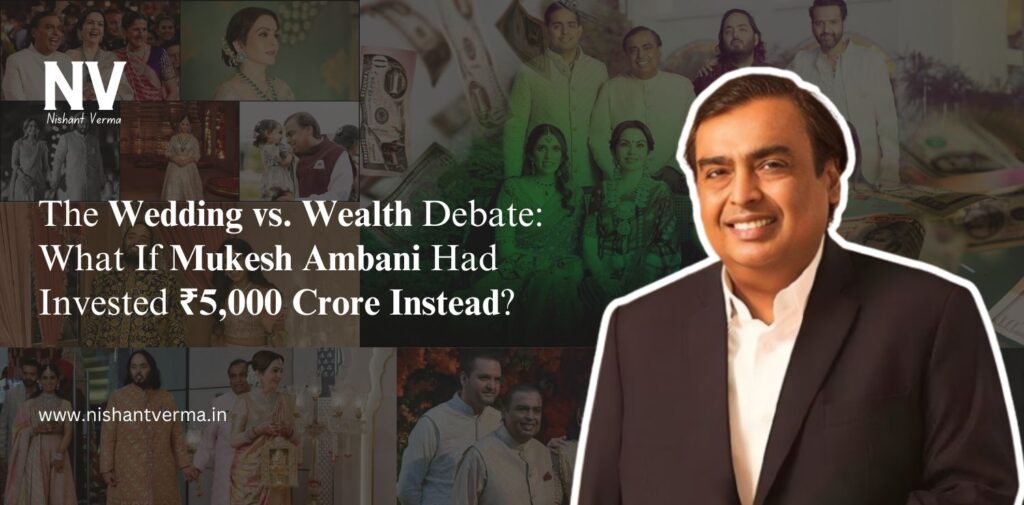When Mukesh Ambani, one of India’s wealthiest industrialists, reportedly spent ₹5,000 crores on his son Anant Ambani’s wedding, it made headlines around the world. The grandeur and opulence of the event were a testament to the Ambani family’s wealth and status. But what if, instead of spending that astronomical sum on a lavish wedding, Mukesh Ambani had heeded the advice of financial influencers—commonly known as FinFluencers—and invested that ₹5,000 crores into a humble index fund? As the story unfolds, you might find that financial prudence sometimes trumps even the grandest of celebrations.

The Financial Alternative: ₹5,000 Crore into an Index Fund
Imagine this: instead of pouring ₹5,000 crores into a wedding that dazzles for a few days but fades in memory over time, that sum is invested in a diversified index fund. Let’s assume an average annual return of 12%—a reasonable estimate considering historical performance in Indian equity markets.
Over 25 years, the power of compound interest would work its magic. Using the formula for compound interest, the future value of this investment would be staggering:
A=P×(1+rn)nt A =
Where:
- P = ₹5,000 crores (the principal investment)
- r = 0.12 (annual rate of return)
- n = 1 (compounded annually)
- t = 25 years
Using this formula, the ₹5,000 crore investment would grow to approximately ₹1,66,91,35 crore (₹1,669,135 crore). Even if we adjust for inflation and consider potential market fluctuations, the amount would still likely be immense, dwarfing the original investment. This sum would not only secure the financial future of generations of Ambanis but also represent a monumental opportunity for philanthropy, business expansion, or socio-economic impact.
The Psychology of Spending: Immediate Gratification vs. Long-Term Wealth
Why do people—even the wealthiest—choose to spend rather than save? The answer often lies in psychology. Immediate gratification is a powerful motivator. The idea of throwing a wedding that becomes the talk of the town cements one’s social status, and that creates lifelong memories for the family, can be more appealing than an abstract concept of wealth that might be enjoyed decades later.

However, financial influencers argue that this mindset can be limiting. The notion of delayed gratification—postponing smaller rewards today for much larger gains tomorrow—is a cornerstone of wealth building. In the case of the Ambanis, while a lavish wedding certainly brought joy and celebration, the question remains: could the same amount of joy have been achieved with a smaller budget, while the rest was invested for future returns?
This isn’t to say that weddings or celebrations should be modest to the point of being joyless. Rather, it’s about balance—recognizing that the resources used today could multiply and bring even greater happiness and security in the future.
The Impact of Wealth Accumulation: Beyond Personal Gain
Had the ₹5,000 crores been invested, the Ambani family wouldn’t just have seen personal financial gains. The impact of such a massive sum growing over decades could have had far-reaching implications. Consider this:
Economic Growth: Large-scale investments in index funds would have fueled the capital markets, contributing to economic growth. The money could have been used by companies to expand, innovate, and hire more employees, thus contributing to the overall prosperity of the nation.
Philanthropy: With over ₹1,669,135 crores after 25 years, the Ambanis could have established one of the largest philanthropic foundations in the world. This could fund education, healthcare, environmental initiatives, and poverty alleviation efforts on an unprecedented scale.

Business Expansion: The Ambanis could have used this massive wealth to further diversify their business empire, entering new industries, investing in startups, and even leading technological revolutions. The potential for job creation and economic development would be enormous.
Legacy and Influence: Beyond the monetary value, this strategy could redefine what it means to leave a legacy. Instead of being remembered for an extravagant wedding, the Ambanis could be remembered for their foresight in wealth management, their contributions to society, and their unparalleled success in business.
Investing in the Future: A Lesson for All
While Mukesh Ambani’s financial decisions are in a league of their own, the underlying lesson applies to everyone. The principles of compound interest, the importance of long-term investing, and the concept of delayed gratification are universal. Whether you’re a billionaire or a middle-class earner, these strategies can dramatically improve your financial situation over time.
Here are a few key takeaways for the average investor:
Start Early: The sooner you start investing, the more time your money has to grow. Even small amounts can snowball into significant wealth if given enough time.
Consistency is Key: Regular investments, even if they are modest, can lead to substantial wealth accumulation over the long term. This is especially true when investing in stable, diversified assets like index funds.

Understand the Power of Compounding: Reinvesting your earnings can exponentially increase your wealth. The longer you let your investments grow, the more you benefit from compound interest.
Balance Spending and Saving: Enjoy your life and celebrate important milestones, but remember that every rupee spent today is a rupee that won’t be growing in your future. Striking a balance between living for today and planning for tomorrow is crucial.
Diversify Your Investments: While this hypothetical scenario focuses on an index fund, in reality, a diversified portfolio—including stocks, bonds, real estate, and other assets—can provide more stability and reduce risk.
Conclusion: The Real Value of Money
In the end, the debate isn’t about whether Mukesh Ambani should or shouldn’t have spent ₹5,000 crores on his son’s wedding. It’s about understanding the value of money and the potential it holds for the future. By thinking beyond immediate gratification and considering the long-term impact of our financial decisions, we can make choices that not only benefit us but also the world around us.
Investing in an index fund, as FinFluencers might suggest, is one way to ensure that today’s wealth continues to grow and support future generations. While the Ambani family will always be associated with luxury and grandeur, the true measure of wealth lies in its ability to create lasting value, both for the family and for society as a whole.
So, as you consider your financial future, ask yourself: will you choose the immediate satisfaction of a grand celebration, or will you invest in a future where your wealth can multiply, benefiting not just you but generations to come? The choice, as always, is yours.




